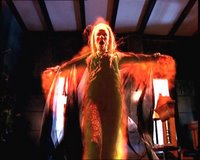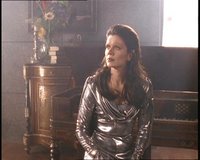 Directed By: Russell Mulcahy
Directed By: Russell Mulcahy
Season 2, released 1999
Contains spoilers
The Hunger was a supernatural TV series of short films produced by Tony and Ridley Scott. Despite the involvement of Tony Scott and the name of the series this was not related to the 1983 movie, though the series 1 DVD insert claims it was inspired by said film. Unlike season 1, though there was often a sexual aspect, there wasn’t the same explicitness in all the episodes. Season 2 was introduced, episode by episode, by David Bowie portraying the spirit of the character he played in the season opener. The series itself is very good generally; however the quality can vary, from the pure horror (generally good) through to something like the Red Shoe Diaries with a murder/supernatural twist (poor).
Nunc Dimittis was based upon a short story by Tanith Lee and, I guess, could have been named the Renfield’s Tale. The title actually comes from the Latin of a canticle, the English version, from the Divine Office, of the beginning being:
At last, all-powerful Master,
You give leave to your servant
to go in peace, according to your promise
Which sums the story up beautifully.  We begin with Vassu (David Warner), the servant in question. There is some nice thumbing of the nose at traditional vampire story imagery. There are cloves of garlic hanging in the kitchen and Vassu catches a moth but, rather than eat it, he releases it into the city night. He takes a tray to his mistress the Princess Daragan Draculus (Marina Orsini). When with her he informs her that he is dying, with perhaps a few more days left. The look the filmmakers gave her is interesting, she is old and her ears are pointed. Continuing with the thumbing of traditional vampire stories, she wears a cross.
We begin with Vassu (David Warner), the servant in question. There is some nice thumbing of the nose at traditional vampire story imagery. There are cloves of garlic hanging in the kitchen and Vassu catches a moth but, rather than eat it, he releases it into the city night. He takes a tray to his mistress the Princess Daragan Draculus (Marina Orsini). When with her he informs her that he is dying, with perhaps a few more days left. The look the filmmakers gave her is interesting, she is old and her ears are pointed. Continuing with the thumbing of traditional vampire stories, she wears a cross.
Interspersed we see scenes of Snake (Jacob Tierney), a male prostitute, drug addict, thief and homeless kid.
The Princess reminisces with Vassu about her youth, about her hunger and her lusts – though now she sleeps seldom and eats little. Vassu informs her that he wishes to perform one last service, that of finding her a new servant, and leaves to search the city for a suitable replacement. Snake is following him when he stops, standing in the street whilst he remembers. He remembers being chased by angry townsfolk, whilst bleeding, and stumbling across the Princess in the woods, she seems to blaze. Snake tries to mug Vassu in an alleyway but the old man easily disarms him and tosses him across the alley. Then he returns the young man’s gun and offers him a warm meal. Snake, believing him to be a trick, follows.
True to his word, Vassu feeds the young man and ignores his fairly obvious petty larceny. He tells Snake that he has been brought for the Princess and it is clear that Snake half recognises her name. This is in reference to Dracula, of course, and Vassu informs Snake that she is of another branch of the family, he also makes reference to being ten times Snake’s age. Snake obviously does not believe in vampires, but couldn’t really care less what these rich marks call themselves. Then he is introduced to the Princess, who has the neat trick of being able to light candles with a gesture.
 He is fascinated by her cross (we learn later that Vassu was as well) but it is denied to him. He tries to act sexually towards her, whore to client, and she reacts angrily, becoming a blazing beacon of light. Snake runs from the house. When asked, Vassu says he chose him because he is like Vassu was when she found him, Snake has the same anger. Vassu noticed a long lost fire in his Mistress’ eyes when Snake was there. It is clear that the Princess approves of the choice.
He is fascinated by her cross (we learn later that Vassu was as well) but it is denied to him. He tries to act sexually towards her, whore to client, and she reacts angrily, becoming a blazing beacon of light. Snake runs from the house. When asked, Vassu says he chose him because he is like Vassu was when she found him, Snake has the same anger. Vassu noticed a long lost fire in his Mistress’ eyes when Snake was there. It is clear that the Princess approves of the choice.
Snake dreams of the forests. He awakens in Hell, or that is what his ‘home’ – an abandoned pool filled with misfits and junkies – suddenly appears to be, a noisy bedlam that summoned up a feeling of Boch or Dante. Two toughs find him and he is stabbed, back at the house Vassu feels the stabbing. Snake struggles back to the house and is taken to the Princess.  She tells him that, as Vassu informed him, she is from a different branch of the family to the infamous Count and the family branches have different ways. She then slits her own throat and has the young man feed. The blood heals his wounds and the Princess becomes young again. They love (though the scene is very understated compared to such scenes in season 1, a hint and no more) as Vassu falls in the kitchen, finally at rest.
She tells him that, as Vassu informed him, she is from a different branch of the family to the infamous Count and the family branches have different ways. She then slits her own throat and has the young man feed. The blood heals his wounds and the Princess becomes young again. They love (though the scene is very understated compared to such scenes in season 1, a hint and no more) as Vassu falls in the kitchen, finally at rest.
As the film ends Snake is now the servant and the Princess has maintained her newly regained youth.
This is a fascinating tale. Not only does it, very gently, ignore standard vampire myth factors (the cross, the garlic and the servant not eating bugs) but it offers a fairly unique perspective – that of the human servant. Of course we often see the human servant and, in many films, we have show stopping performances – the prime example being Dwight Frye’s performance in Dracula (1931) - but too often (as in the mentioned film) the servant is mad and, whilst they may take an active part, the story never focuses primarily on them. In this case we focus on the servant, the servant seems sane and, even more interestingly, the servant is redeemed by the vampire.
Both Vassu and Snake are criminals, both are very close to losing their lives because of their lifestyles and it is through the vampire they are given a purpose, elongated lives and a genteel air rather than the air of the thug.
This is underpinned by the scenes in the house which, despite the Princess’ angry display of powers, seems refined and civilised and the scenes in the outside world, which are brutal and chaotic.  It is also suggested that the tie between vampire and servant is intimate, not just in a sexual sense but in a sense of condition. When Vassu, who has reached the end of his extended life, is the servant, we see a vampire who is ancient, a vampire that may be coming to the end of her life. When Vassu gives her a young replacement she too becomes young.
It is also suggested that the tie between vampire and servant is intimate, not just in a sexual sense but in a sense of condition. When Vassu, who has reached the end of his extended life, is the servant, we see a vampire who is ancient, a vampire that may be coming to the end of her life. When Vassu gives her a young replacement she too becomes young.
The acting is good. The interaction between Vassu and the Princess is believable and both come across as refined, the proper lady and servant. The role of Snake is convincingly played by Tierney; we can believe him to be the thug faced with things beyond his understanding.
This is a great short film and a worthy episode of the series, though one would expect that given that the story came, originally, from a source as creative as Tanith Lee. The only real problem is that we are given a fascinating glimpse of incredibly interesting characters and perhaps an episode of more substantial length would have given us even more. 7 out of 10 for a stylishly filmed, fascinating look at the genre.
The imdb page is here.
Saturday, September 16, 2006
The Hunger “Nunc Dimittis” – Review (TV Episode)
Subscribe to:
Post Comments (Atom)














No comments:
Post a Comment